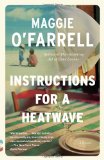Summary | Excerpt | Reading Guide | Reviews | Beyond the Book | Readalikes | Genres & Themes | Author Bio

He seems to feel a twitching in his limbs, she's noticed, a kind of vestigial urge to set off, to get going, to be out in the world. Any minute now, she knows, he'll be off to the newsagent's.
With a hand on her bad hip, she pushes the chair out from the table with her foot, and Robert says, "I'll just go round the corner and get the paper.
"Right you are," she says, without looking up. "See you in a bit."
Gretta sits herself down at the table. Robert has arranged everything she needs: a plate, a knife, a bowl with a spoon, a pat of butter, a jar of marmalade. It is in such small acts of kindness that people know they are loved. Which is, she reflects as she moves the sugar bowl to one side, surprisingly rare at their age. So many friends of hers feel overlooked or outgrown or unseen by their husbands, like furniture kept too long. But not her. Robert likes to know where she is at all times, he frets if she leaves the house without telling him, gets edgy if she slips away without him seeing, and starts ringing the children to question them on her whereabouts. It used to drive her crazy when they were first married—she used to long for a bit of invisibility, a bit of liberty—but she's used to it now. Gretta saws a hunk from the end of the loaf and slathers it with butter. She gets a terrible weakness in her limbs if she doesn't eat regularly. She told a doctor, years ago, that she thought she had hypoglycemia, after reading about it in a Sunday newspaper. Which would have explained her need to eat quite so often, wouldn't it? But the doctor hadn't even looked up from his prescription pad. "No such luck, I'm afraid, Mrs. Riordan," he'd said, the cheeky so-and-so, and handed her a diet sheet.
The children all love this bread. She makes an extra loaf if she's going to visit any of them and takes it, wrapped in a tea towel. She's always done her best to keep Ireland alive in her London-born children. The girls both went to Irish-dancing classes. They had to catch the bus all the way to a place in Camden Town. Gretta used to take a cake tin of brack or gingerbread with her to pass around to the other mothers—exiled like her from Cork, from Dublin, from Donegal — and they would watch their daughters dip up and dip down, tap their feet in time to the fiddle. Monica, the teacher had said after only three lessons, had talent, had the potential to be a champion. She always knew, the teacher had said, she could always spot them. But Monica hadn't wanted to become a champion or to enter the competitions. I hate it, she'd whisper, I hate it when everyone looks at you, when the judges write things down. She'd always been so fearful, so cautious, so backwards in coming forwards. Was it Gretta's fault, or were children born like that? Hard to know. Either way, she'd had to allow Monica to give up the dancing, which was a crying shame.
Gretta had insisted on regular Mass and communion for each of them (although look how that had turned out). They'd gone to Ireland every year for the summer, first to her mother's and then to the cottage on Omey Island, even when they'd got older and started to moan about the journey. When Aoife was little, she'd loved the excitement of having to wait for the tide to draw back off the causeway, revealing the slick, glassy sand, before they could walk over. "It's only an island sometimes," Aoife had said once, when she was about six, "isn't that right, Mammy?" And Gretta had hugged her and told her how clever she was. She'd been a strange child, always coming out with things like that.
They were perfect, those summers, she thinks now, as she bites down into her second slice of bread. Monica and Michael Francis out roaming until all hours and, when Aoife came along, a baby in a crib to keep her company in the kitchen, before she went out to call the others in for their tea.
Excerpted from Instructions for a Heatwave by Maggie O'Farrell. Copyright © 2013 by Maggie O'Farrell. Excerpted by permission of Knopf, a division of Random House LLC. All rights reserved. No part of this excerpt may be reproduced or reprinted without permission in writing from the publisher.
Your guide toexceptional books
BookBrowse seeks out and recommends the best in contemporary fiction and nonfiction—books that not only engage and entertain but also deepen our understanding of ourselves and the world around us.